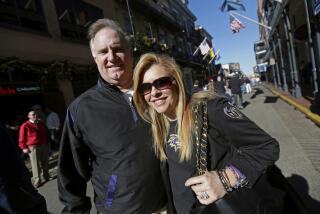He Sets Policy in Middle
- Share via
Usually, when a man has political ambitions, he’s careful to cultivate an image as a man of compassion, full of caring and concern. A kinder, gentler American. He goes around kissing babies, listening sympathetically to the complaints of constituents, procuring food for the poor, tax breaks for the rich. Everybody’s pal.
What he certainly doesn’t do is go around slamming voters onto the ground, smashing forearms into their jaws, dislocating their shoulders, separating them from their senses in bear-hugs, baring his teeth and snarling at them, crashing into them, trying to twist their hats off or holding them upside down by the ankles and shaking them. The last politician to take that route to high office was Hitler.
Yet, you would have to say this is precisely the campaign strategy of political candidate Riki Ellison, Esq.
Don’t look for him ever to get any votes from, oh, say, John Elway, Dave Krieg, Troy Aikman or Jim Everett. I wouldn’t expect to see any tight ends passing out literature for him. Wide receivers or running backs can’t be expected to be heavy contributors to his campaign funds.
Riki Ellison, you see, is a middle linebacker by profession. We haven’t had too many of those in the White House. Or the State House.
A middle linebacker is a kind of antisocial, highly territorial animal who doesn’t actually dislike humanity--just that part of it with the ball. Genghis Khan was probably a middle linebacker. So was Attila.
A linebacker is kind of a grim, incorruptible cop who hates crime and criminals. And a middle linebacker considers anybody with the football a criminal. Fleeing prosecution. Society should be protected against these types.
Dick Butkus was a middle linebacker, to give you an idea. So was Ray Nitschke. Hacksaw Reynolds. It’s not a position, it’s a punishment. A middle linebacker has to be part athlete, part archangel. He’s the avenger. He keeps the faith. Even if he has to break arms to do it.
When a visiting journalist asked defensive end Howie Long where linebacker Ellison’s locker was, Long jerked a thumb down the room.
“Down there in the psychos’ corner,” he snapped.
Linebackers like to meddle in things. A linebacker could never be an innocent bystander. When Ellison met President George Bush, he didn’t content himself with a polite murmur and a bow of the head. He demanded to know why the Administration wasn’t pushing the Strategic Defense Initiative more strenuously.
Middle linebackers can’t stand tranquility. They’re happiest when they see bodies flying through the air. A linebacker would root for a volcano.
Ellison has been one of the best at this demolition derby for eight seasons. Now with the Raiders, he was with the San Francisco 49ers, a team he led in tackles two seasons and finished second or third in three others. He has leveled 477 ballcarriers in that time.
Ellison thinks his is the best position on the team. Quarterback comes close. But you can’t hit anybody from there. Ellison feels the middle linebacker is the quarterback of the defense. He takes the signals from the bench but has the authority to call a change if he spots a shift in offensive alignment.
It would not seem to be the best platform from which to launch a career in politics, but Riki almost ran for the Assembly district in San Mateo a year ago and plans to enter the political arena in a serious way as soon as he has stopped stacking up running backs at the line of scrimmage or digging elbows in the sides of passing receivers in the secondary.
It might be ideal training for politics, at that.
Riki can’t ever be President. He was born in Christchurch, New Zealand, and didn’t come to America until he was 8. But, secretary of state--or defense--is not out of the question for naturalized citizens, as Henry Kissinger has proved.
Riki fell in love with football when he saw Lynn Swann playing for the USC Trojans in the 1970s. Riki’s mother was given a dance scholarship to USC and brought her family to the United States with her. Riki was a rugby player growing up and took to American football like a chorus girl to a mink coat.
At USC, Riki played under the name of his stepfather, Gray, but returned to the name of his birth father when he made the pros. Under any other name, he hit as hard.
In between making tackles at SC--286 of them, 131 in his senior season--Ellison developed a taste for world politics, particularly Middle East conflicts.
“I took international relations and I got in this discussion group made up of equal parts Arabs and Israelis and the more heated the discussion got, the more I learned,” he says.
A middle linebacker likes confrontation off the field, too.
Ellison’s specialty in international relations prompts him to take an unpopular stand in America’s current Middle East policy. But then, middle linebackers are used to unpopular positions.
“I wouldn’t send troops in,” he says. “Why is it up to us to protect the oil? The rest of the world has more to lose than we have. Japan, for instance. Their stake is higher than ours. So is Europe’s. Why do we have to spend $20 million a day to protect the oil fields when they need them even more than we do?”
It is not likely the White House will take Ellison’s views into consideration, although Ellison describes himself politically as “Republican--but liberal Republican.”
If his ambitions materialize, they may one day pay more attention. Ellison spent last summer as a lobbyist in Washington and developed a taste for government.
“I want to get in an area of public service,” he says. “I don’t want to be known as just a football player. I want to be remembered for trying to do some good in the world.”
It’s probably an understandable ambition for a guy who has spent most of his life passing out nosebleeds.
If he can just remember to shake hands with the voters and not try to blind-side them. He may be the first guy to run for office whose opponents have to remember to wear a face mask to the debates.
More to Read
Get the L.A. Times Politics newsletter
Deeply reported insights into legislation, politics and policy from Sacramento, Washington and beyond. In your inbox three times per week.
You may occasionally receive promotional content from the Los Angeles Times.










